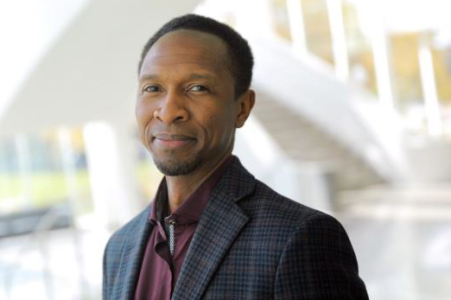What’s in this Issue
- 2020 Conrad Wright Lecture Report
- Dictionary of Unitarian and Universalist Biography Announces 2021 Prizes
- News from the James Luther Adams Foundation
- Calling All Congregational Historians!
- President’s Message
- Unexamined History Project Changes the Narrative
- Become a Member of UUHHS Today
2020 Conrad Wright Lecture Report
Dr. Nicole C. Kirk, Vice President of the UUHHS Board
Due to the pandemic, the 2020 Unitarian Universalist Association General Assembly set to meet in Providence, Rhode Island, was moved to an online format. Dr. Sylvester Johnson the director of Virginia Tech’s Center for the Humanities, assistant vice provost for the humanities, and the executive director of the university’s Tech for Humanity Initiative, delivered the talk to a large crowd of over 400 people who stayed throughout the pre-recorded talk on Zoom.
Dr. Johnson’s lecture, “Charting a Future for Inclusive Democracy,” explored the timely theme of growing inequality in the United States. His talk examined structural disparities due to race, wealth, and technology. Drawing on anti-racist activism, he identified significant challenges to democracy and proposed transformative strategies to chart a bold future for inclusive democracy. A lively question and answer session followed the talk with over 300 people lingering for this part of the session. Overall, it was a great success! Thank you to our members for making the Conrad Wright Lecture possible.
Dictionary of Unitarian and Universalist Biography Announces 2021 Prizes
Rev. Connie Simon, Editor of the DUUB
 Your UUHHS Board is committed to increasing the number and depth of Unitarian, Universalist and UU histories available to researchers and to the public. Over the years, many dedicated and talented contributors have submitted entries about the most famous and widely known UUs (and some lesser-known ones as well). We are extremely grateful for their scholarship.
Your UUHHS Board is committed to increasing the number and depth of Unitarian, Universalist and UU histories available to researchers and to the public. Over the years, many dedicated and talented contributors have submitted entries about the most famous and widely known UUs (and some lesser-known ones as well). We are extremely grateful for their scholarship.
Our nation’s and our denomination’s current struggles with systemic racism, oppression and white supremacy culture have created opportunities for us to dig deeper into the complexities of our own history – to recognize that there is not just one story, but many. And many of those stories often go untold. With this in mind, we announce the DUUB 2020-2021 prize competition. We are actively soliciting both “new” biographies (those for which an entry has not been previously published in the DUUB) and “revisited” biographies (updates of entries published before 2010 that revise, revisit, retell or otherwise present the existing biography through an anti-racism, anti-oppression frame of reference).
We will award a monetary prize for the best submission in each of these three categories:
- Marginalized Identity Prize ($300) – This prize will be awarded in 2021 for the best new biography of a Black, Indigenous or other Person of Color (BIPOC), LGBTQ+, or disabled Unitarian, Universalist or Unitarian Universalist. Biographies are not limited to be about religious professionals; essays about UU lay leaders, congregants, activists, and others are welcome. Entries should be no more than 2,500 words in length and include a list of sources consulted.
- New Biography Prize ($200) – This prize will be awarded in 2021 for the best new biography of a non-BIPOC, LGBTQ+ or disabled Unitarian, Universalist or Unitarian Universalist. Biographies are not limited to be about religious professionals; essays about UU lay leaders, congregants, activists, and others are welcome. Entries should be no more than 2,500 words in length and include a list of sources consulted.
- Revisited Biography Prize ($100) – This prize will be awarded to the best revision or retelling of an existing biography published before 2010 through an anti-racism, anti-oppression frame of reference. Biographies are not limited to be about religious professionals; essays about UU lay leaders, congregants, activists, and others are welcome. Entries should be no more than 2,500 words in length and include a list of sources consulted.
Submissions from BIPOC and others of marginalized identities are strongly encouraged. The deadline for submissions is June 1, 2021. Please direct entries and questions to DUUB Editor Connie Simon at editor@nulluudb.org. In addition to the monetary award, winners will receive a free one-year membership in the Unitarian Universalist History and Heritage Society. All submissions will be considered for publication in the Dictionary of Unitarian and Universalist Biography.
News from the James Luther Adams Foundation
 The JLAF, which originally formed in the 1970s to support Jim Adams’s work during his retirement, sponsors the annual James Luther Adams Forum on Religion and Society. This year’s Forum has been rescheduled to April 23, 2021, in Charlottesville, Virginia. Charles T. Mathewes, a distinguished professor in the Department of Religious Studies, University of Virginia, will speak on “The Future of American Christianity After the Religious Right.” We hope to be able to gather an in-person audience at that time; but will live-stream the event in any case, a first in the long history of the JLA Forum.
The JLAF, which originally formed in the 1970s to support Jim Adams’s work during his retirement, sponsors the annual James Luther Adams Forum on Religion and Society. This year’s Forum has been rescheduled to April 23, 2021, in Charlottesville, Virginia. Charles T. Mathewes, a distinguished professor in the Department of Religious Studies, University of Virginia, will speak on “The Future of American Christianity After the Religious Right.” We hope to be able to gather an in-person audience at that time; but will live-stream the event in any case, a first in the long history of the JLA Forum.
A current priority of the Foundation is the development of its website as a resource for liberal theology and social ethics in the tradition of JLA. Pages include Forum—listing speakers and texts of JLA Forums since 1996; Resources—works by and works about Adams, bibliographies, information on university archives, including access to the Adams films from 1930s Germany; and Conversations—open discussion of current topics relating to Adams’s intellectual and spiritual legacy. Website subscribers are urged to comment on posts, submit new posts, and lend support as Friends of JLAF.
Website at www.jameslutheradams.org Inquiries and submissions: Rob Packenham, Web Associate, info@nulljameslutheradams.org, or George Kimmich Beach, President, editor@nulljameslutheradams.org.
Calling All Congregational Historians!
Dan McKanan, Secretary of UUHHS Board
 If you serve, formally or informally, as the historian or archivist of your congregation, we’d love to hear from you! The UUHHS is developing a comprehensive database of congregational histories that have already been written and of archival resources available for the writing of congregational histories. We are also developing a national network of historians and archivists who will stay connected for mutual support and information sharing. As so many congregations are revisiting their histories to better understand our movement’s entanglement in white supremacy and other forms of structured injustice—as well as our history of struggle to overcome injustice—both the database and the network will be vital resources for the work that lies ahead.
If you serve, formally or informally, as the historian or archivist of your congregation, we’d love to hear from you! The UUHHS is developing a comprehensive database of congregational histories that have already been written and of archival resources available for the writing of congregational histories. We are also developing a national network of historians and archivists who will stay connected for mutual support and information sharing. As so many congregations are revisiting their histories to better understand our movement’s entanglement in white supremacy and other forms of structured injustice—as well as our history of struggle to overcome injustice—both the database and the network will be vital resources for the work that lies ahead.
At this time we are especially looking for volunteers willing to reach out to 5-10 other congregations to compile information and build the network. If you are able to volunteer in this way, please be in touch with Dan McKanan (dmckanan@nullhds.harvard.edu ) who will inform you of the exact process.
This project builds on a survey already conducted by the MidAmerica Region’s History and Heritage Committee. If you are a congregational historian in that region and aren’t already connected to that committee, please let us know and we will put you in touch with them!
PRESIDENT’S MESSAGE
Just as General Assembly and our Conrad Wright Lecture were conducted via Zoom this year, so too was the Annual Meeting of UUHHS. The result was the participation of far more members of the Society, a result so satisfactory that I suspect virtual annual meetings will become the norm.
We continue toward consolidation with Collegium, scholars of our faith tradition who are not only historians, but also from cultural and interreligious studies, theology and ethics. The new group is likely to be “The Society for Unitarian Universalist Studies.” or something close to that. Groups are currently drafting a mission statement and a compendium of proposed programs. Scholarly gatherings are likely to occur on a biennial basis. In August, the leaders of both groups took part in a joint study and discussion of Widening the Circle of Concern, the recent Report of the UUA Commission on Institutional Change. We agreed to bear in mind its insights about what is necessary to dismantle a culture of white supremacy as we plan the mission and governance of a new institution among us. A spirit of change is in the air, and we are committed to making the product of our shared efforts greater than the sum of its parts. We have set a timeline to work out details by spring 2021, in time for joint programming at the next General Assembly.
We are in conversation with Meadville Lombard Theological School about the possibility of centering our financial administration and meeting planning at that institution. Dr. Elias Ortega, President of Meadville Lombard, has been encouraging, since our mission and purposes are clearly compatible. The School has long played a role in such matters for Collegium, and UUHHS readily admits that we need a base from which to continue to improve our systems for handling membership and financial matters. Already we are making some notable improvements. If you visit the UUHHS webpage to join or donate at https://uuhhs.org/join/, you will already find some, thanks to our member and leading IT volunteer, Jay Kiskel, of Atlanta, GA. Thanks, Jay! Another ambition is to put more discussions and resources online, and to make the Dictionary of UU Biography (duub.org) more complete, up-to-date, and user-friendly. We are eager to tackle areas of needed organizational work.
We are also aware of areas of neglected scholarship. For example, recently I have been studying William Henry Channing, the far more radical nephew of the more famous Dr. William Ellery Channing. The younger man was a close friend of Margaret Fuller, a Christian socialist, an abolitionist, women’s rights advocate, the Chaplain of the U.S. House of Representatives during the Civil War, and successor to James Martineau in one of the leading Unitarian pulpits in England. We have a reading in our hymnal, #484, “My Symphony,” taken from a letter he wrote to Fuller. Yet only now are we about to include a brief bio of him in our Dictionary of UU Biography, thanks to the Rev. Dr. Barry Andrews. As its new editor, Rev. Connie Simon, will tell you, there are many significant biographies to assign, write, and post or revise.
In his Memoir of William Henry Channing (1888), Channing’s friend O.B. Frothingham remarked that “Liberalism and socialism seem to go together. The Polish Unitarians of the seventeenth century were exceedingly radical.” Yet that is another strand of our history often overlooked since the great work of Earl Morse Wilbur, George Hunston Williams, and John Godbey. In that regard, we are pleased to announce that, thanks to a generous gift and bequest intention from Rev. Dr. Jay Atkinson, UUHHS has established a “Socinus Endowment Fund,” devoted to encouraging study of the history and contemporary relevance of the Polish Brethren. The first use of the gift will be for an essay contest in 2021. The Socinus Fund also intends to subsidize research and translation into English of the many Unitarian texts in neo-Latin that were read by people like John Locke and Grotius.
Let me close by asking you this: What area of Unitarian Universalist studies do YOU consider a neglected area of scholarship? If you are not already on our list-serve, uuhhs-chat, please consider joining. Just go to http://lists.uua.org/mailman/listinfo/uuhs-chat. Members active on the list are often very helpful. There may be works in print or online with which you are unfamiliar. Then again, who knows? Perhaps YOU will be inspired to do some research and writing in a neglected area and share your research with the group.
Yours in shared scholarship
John A. Buehrens
Unexamined History Project Changes the Narrative
Gail Forsyth-Gail, Rev. Lee Bluemel and Nancy Lennhoff
North Parish of North Andover, MA, will celebrate its 375th Birthday this year. Now a Unitarian Universalist congregation, it was once a Puritan congregation known as the First Church of Christ at Cochichawicke. It was founded in 1645 by English settlers who founded the town of Andover, colonizing the traditional territories of the Pennacook in the Merrimack River Valley. The usual telling of the congregation’s history, which was intertwined with that of the town, centered the courage, diligence, and sacrifice of the parish founders and their descendants. It left out large unacknowledged pieces of the story. The usual telling omitted references to the indigenous people in whose traditional territory a thriving settler community grew up. It omitted reference to the enslaved people whose labor made it possible for the descendants of the founders to accumulate the wealth which laid the financial foundation from which the congregation continues to benefit today.
Inspired by a sermon nearly three years ago, a small team of parishioners set out to research some of the “invisible” history and make it known. The team included researchers, writers, editors, and people with professional skills in information design and display. The team focused on four chapters of the history: the Pennacook, in whose traditional territory the meeting house was built, the 1692 witchcraft trials, the practice of using the labor of enslaved people, and social segregation and inequality after the end of slavery. It became obvious to the research team that information was not invisible, but rather present in many primary and secondary sources. The project, supported by the parish and the Fund for Unitarian Universalism, eventually resulted in four museum-quality posters, and was named “Hidden in Plain Sight: the Unexamined History of a New England Parish and Town.”
Throughout the project, the team was in conversation with parishioners, offering opportunities to learn and respond to what was being discovered, including an extended period when draft posters were on the wall and available for comment. The team developed a statement of acknowledgment and promise regarding this history, which unanimously passed the annual meeting in June 2019.
Then, pandemic caused the building to be shut down and derailed 375th birthday preparations. The unexamined history project team reworked the information, added the statement of acknowledgment and promise, and re-formatted the posters into a booklet which is now available on the website for viewing. The booklet form is enabling the parish to engage with public school teachers, local faith communities, historical societies, newspapers, and other UU congregations interested in a similar project. It has helped us to broaden the effort to shift the narrative about the town’s history to center the experiences of those who were previously on the margins.
The 24-page booklet is linked to the North Parish website and available for you to view. Printed copies are also available by arrangement. For details, please contact nphistory@nullgooglegroups.com.
For more information about how the project unfolded, please read “Hidden in Plain Sight: The Unexamined History of a New England Parish and Town,” an article in the latest Journal of Unitarian Universalist History.
BECOME A MEMBER of UUHHS TODAY
We invite you to become a member of the UU History & Heritage Society. By joining UUHHS, you help promote and preserve Unitarian, Universalist, and Unitarian Universalist history. A deeper understanding of our past is key in this moment of transformation, racial justice, and a part of the work towards healing and restoration. We ask all current members – check in with your friends – your colleagues – and invite them to join. Send them the info. It takes just a minute or two and is vital to sustaining our shared work. Here are some of the benefits of membership:
- a copy of the Journal of Unitarian Universalist History (https://uuhhs.org/journal-of-uu-history/);
- supporting and expanding the resource DICTIONARY OF UNITARIAN UNIVERSALIST BIOGRAPHY: http://uudb.org ;
- the Annual Conrad Wright Lecture;
- announcements for lectures and other special events;
- support a listserv for UU history questions and community;
- supporting the larger work of the UU history and heritage society and encourages and supports the interpretation, analysis, and preservation of Universalist and Unitarian history.
It only takes a moment to become a member. Membership dues are:
- Individual one year $50
- Individual three years $125 (Recommended)
- Student or Low Income $30
JOIN online OR send a note requesting membership and a check. Please include in your note your name, address, email, and phone to:
- UUHHS
- 670 High Street
- Dedham, MA 02026

